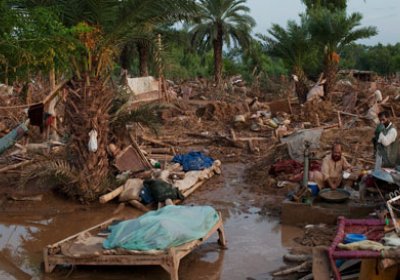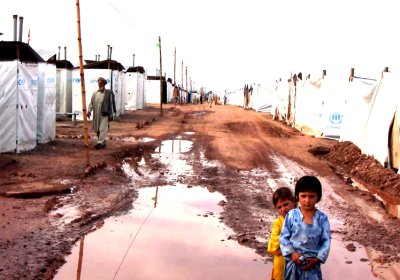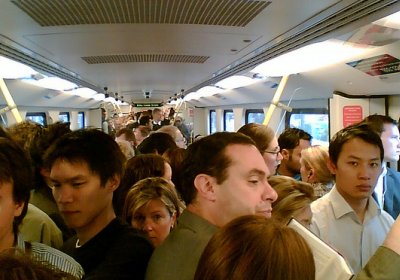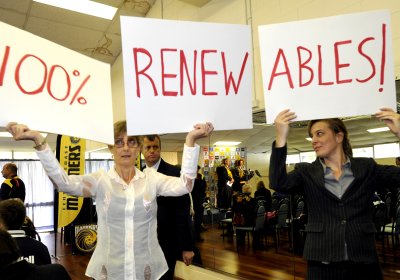On July 29, our Labour Relief Committee team found Pir Sabaq, Khyber-Pakhtoonkhwa province, with a population of more than 34,000, completely destroyed by the flood.
A tent city of more than 1000 tents has been established but most of the people are still forced to live in partially destroyed homes. This could lead to a major building collapsing at any time, with further loss of lives.
In addition to losing their homes, most people have found their household items have been swept away. They have lost their cattle and goats as well. People are without anything to eat, drink or wear.
Environment
On July 28, the UN General Assembly passed a Bolivian resolution to make water and sanitation a human right. No country voted against the resolution, but 41 abstained. The following text is abridged from the speech to the General Assembly motivating the resolution by Pablo Solon, Bolivia’s ambassador to the UN.
* * *
During the last three decades, Afghan people have had to leave their homeland due to civil war and foreign invasions. They began to live in camps set up for them near Peshawar.
During the recent floods in the province of Khyber-Pakhtoonkhwa, the refugee camps in Charsada and Nowsherhra have been completely washed away. The Azakhel refugee camp that housed more than 3000 people has been annihilated by the floods.
Forty-one countries abstained in the July 28 UN General Assembly vote on Bolivia’s resolution to recognise access to water and sanitation as basic human rights.
Rather than honestly vote “no”, they abstained to avoid being labelled as opponents of access to water, but many made statements that revealed their hostility to the very idea of recognising water as a human right.
Australia “had reservations about declaring new human rights in a General Assembly resolution”.
The article is abridged from an August 11 Palestinian Centre for Human Rights report.
* * *
The signs which dot the beach along the Gaza City waterfront read: "This beach is polluted.” Yet they serve only as obstacles for children running to the sea, rather than warnings of the serious health risks.
One need only stroll north along the beach for a couple hundred metres to see raw sewage being pumped directly into the Mediterranean Sea from one of the 16 discharge sites along the coast.
Yet thousands of people fill Gaza's beaches.
By August 12, more than 20 million people had been affected by the floods in Pakistan. Waters remained at dangerous levels in several parts of the country, with more torrential rains forecast by the weather department.
This has been one of the most devastating floods in world history. The UN has once again appealed for donations for Pakistan. But the international response has been slow.
The US emission trading scheme in sulphur dioxide (SO2) — the gas that causes acid rain — is widely held as proof that the market can cut pollution.
Pro-market commentators point to the success of this “acid rain market” as evidence that similar kinds of carbon trading schemes are the best way to tackle climate change.
New York Times columnist Paul Krugman said on April 11 the scheme showed “that it is generally best to rely on a market-based approach”.
But this poster child for emissions trading has now collapsed in a heap.
Prime Minister Julia Gillard’s catch phrase for this election is "sustainable". No longer, according to Gillard, should we look to a big Australia, but a "sustainable" population.
In a speech in western Sydney on July 21, Gillard emphasised the squeeze on health services, transport, roads and infrastructure. She hinted her "sustainable population" mantra would ease the squeeze.
Apart from rhetoric largely designed to pander to irrational fears of immigrants and prejudices against asylum seekers, Labor has failed to explain what it means by "sustainable".
Mumia Abu-Jamal — on death row for more than 30 years in Pennsylvania for a murder he didn't commit — is an iconic figure. Yet while the struggle for his freedom continues, less attention is given to his role as a political leader.
While Mumia has not, to my knowledge, used the term ecosocialist, his passionate message to the US Social Forum on June 22 had a clear ecosocialist content.
WYONG — Climate action activists confronted Prime Minister Julia Gillard on August 3 when she appeared at a soccer club in Wyong on the NSW Central Coast.
She was handed a statement from the local climate action group about transitioning as soon as possible from fossil fuels, to renewable energy and a copy of the Zero Carbon Australia plan by Beyond Zero Emissions.
Activists held placards that said: “Fund solutions not pollution” as Gillard was speaking. They then confronted Gillard as she left the soccer club.
Residents are organising to stop mining company LD Operations plans to start a new coal mine next to the town of Margaret River in Western Australia.
Margaret River is five hours south of Perth famous for its wineries, surfing spots and outstanding natural beauty.
A public meeting on August 1 with only one day’s notice drew 60 people. It is a sign of strong community opposition. There are plans to hold a demonstration as part of the national Walk Against Warming rallies on August 15.
Dismayed by the Labor government’s inaction on climate change and looking for an alternative? Don’t look to the Liberals.
If the ALP has been dodgy on the issue, Tony Abbott’s party has been dodgier.
Sincere commitment on the issue is hard for Abbott. At a public meeting last September, he said global warming was “absolute crap”.
But the Liberal leader is remarkably consistent on one thing — the “need” to funnel large amounts of public money to big business.
- Previous page
- Page 281
- Next page











